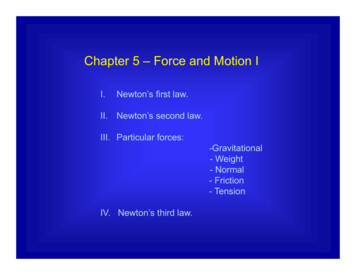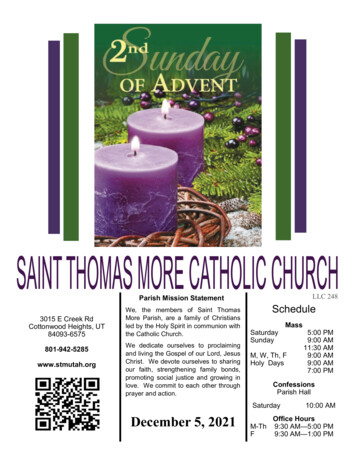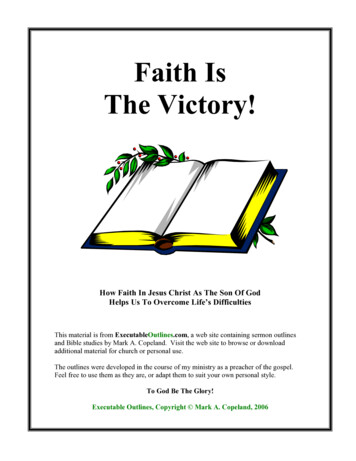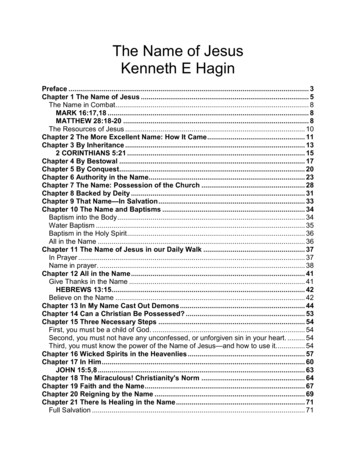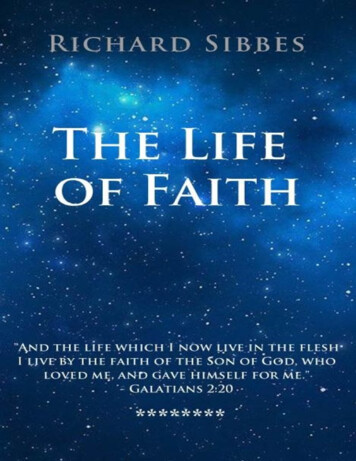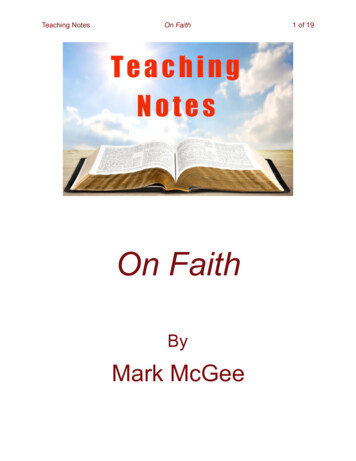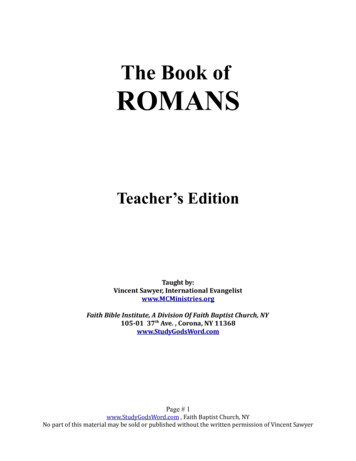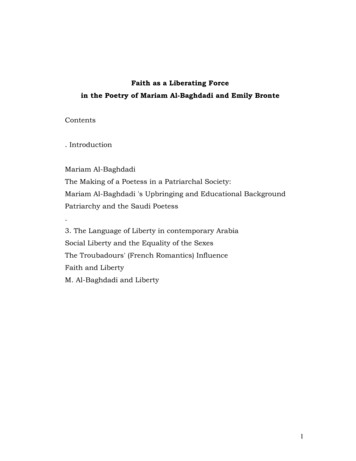
Transcription
Faith as a Liberating Forcein the Poetry of Mariam Al-Baghdadi and Emily BronteContents. IntroductionMariam Al-BaghdadiThe Making of a Poetess in a Patriarchal Society:Mariam Al-Baghdadi 's Upbringing and Educational BackgroundPatriarchy and the Saudi Poetess.3. The Language of Liberty in contemporary ArabiaSocial Liberty and the Equality of the SexesThe Troubadours' (French Romantics) InfluenceFaith and LibertyM. Al-Baghdadi and Liberty1
II . Bronte, Emily5. The Making of a Poetess in a Patriarchal SocietyEmily Brontë's Upbringing and Educational Background.Patriarchy and the Victorian Poetess7. The Language of Liberty in Victorian EnglandSocial Liberty and the Subjection of WomenThe Romantic InfluenceFaith and LibertyEmily Bronte and LibertyConclusionBibliography2
AbstractThis dissertation is a comparative study of the importance of faithin the poetry of two female writers, Mariam Al-Baghdadi (M. AlBaghdadi) and Emily Bronte. The first one is a contemporary Arab(Saudi Arabia) writer and the second is a Victorian British writer. Iwas moved by some similarities between their religious poetryespecially their poems in which they enchant about their faith inthe Creator of the universe. Faith gave the two writers the drive tostrife against the unjust concepts of their rigid patriarchalsocieties. It enabled the poetesses to be liberal in expressing theirviews and to have a career in creative writing despite themisconception of their society that did not think of it asappropriate for women. Though distant in time, place and culture,the two poetesses shared ideas regarding their identities and rightsas human beings that can be thought of as feminist in hindsight.Both writers were brought up by religious but not conventionalfathers. So they were also to develop a very special relationshipwith Allah or God (the Creator of the universe), which did notconcur with the dominant beliefs and attitudes of their twodifferent societies. Both of them think of the Creator as the shelter,refuge and source of strength when challenged by unfair peopleand difficult circumstances. Emily Bronte’s dilemma was far more3
complicated than Mariam's for the latter’s problem was rathersocial not religious. Mariam has very explicit verses from theQur'an and many of Mohammad's Traditions (Hadeeth) andteachings, that affirm the equality of men and women.Nevertheless, the independent protestant heritage, enabling away of questioning things, was accommodating for Emily. Theenlightened approach that Mariam Al-Baghdadi’s and EmilyBronte's fathers exercised in the bringing up of their children wasone of the factors that empowered the two writers. The idea thatwriting poetry was a sinful (Bronte’s case) or shameful (AlBaghdadi’s case) act for women might be one cause behind the twowriters’ clinging to the spiritual side of religion, and turning theirbacks on its cultural side. No wonder that anything they wrote wasreceived with severe criticism and sometimes rejection.Mariam Al-Baghdadi and Emily Bronte, in their quest for libertyfrom the constraints of their respective societies and the oppressiveinterpretation of religion, were pioneer writers (each in her timeand culture) in writing about liberty as a right for them as humanbeings.4
IntroductionThe central thesis of this dissertation is a comparison betweentwo distant female writers, Mariam Al-Baghdadi (M. Al-Baghdadi)and Emily Bronte. I noticed some similarities between theirreligious poetry especially their poems in which they express withgreat enthusiasm their love and faith in the Almighty God. Faithgave the two writers the drive to discord against the unjustconcepts of their rigid patriarchal societies. Though distant in time,place and culture, the two poetesses shared ideas regarding theiridentities and rights as human beings that can be thought of asfeminists in perception. Thespecial relationship they coulddevelop with Allah or God was considered radical in discourse aswell as in action.Background of the studyLong before reading Gilbert and Gubar’s Madwoman in the Attic,I began to notice similarities among the writings of some womenwriters in the East and the West. However, reading the book gaveme the real incentive to pursue and investigate this idea.The fact that M. Al Baghdadi and Emily Bronte could achieve goodpoetry under difficult social systems, might make us wonder how,5
for how long and to what extent can an individual stand defiant tosocial order, and what sustains her/him in such a struggle? Theanswer to these questions lay in the word "FAITH" in God thattranscends into faith in one’s self, one's abilities and it could bethe source of strength and endurance that made these womenattain themselves despite their difficult circumstances.The first poetess is a contemporary Muslim Arab and the a.Chronologically speaking, I should have begun with the nineteenthcentury poetess, but I chose to begin the dissertation with the lessknown poetess, because of her apparent contradictory attitudewhich is not contradictory at all in essence. Her being a religiousMuslim who demands to have her rights as they are explicit in theQur’an and Mohammad’s (pbh) discourse, is the novel thing that Ithought ofbeginning my dissertation with. Yet, despite all thedifferences arising from the remoteness of their cultures, theirpoetry express similar points of view concerning faith and liberty.Both poetesses establish a unique relationship with God based ontheir understanding of the essential tenets of their faith ratherthan the dogmas of institutional religion ( in Bronte’s case) or themoral and social assumptions culturally attached to it by theircontemporaries (in Al-Baghdadi’s case). Predictably, both womenwere considered radicals and severely criticised by their society intheir time and by their contemporaries.The second poetess is the Victorian Emily Bronte. EmilyBronte's personal faith in God is close to that of Mariam AlBaghdadi, for both of them think of Him as the shelter, refuge andsource of strength when challenged by unfair people and difficultcircumstances. Yet, her dilemma was far more complicated thanMariam's.Mariam has very explicit verses from the Qur'an andmany of Mohammad's Traditions (Hadeeth) and teaching, that6
affirm the equality of men and women. Nevertheless, theindependent protestant heritage, enabling a way of questioningthings , was accommodating for Emily. The enlightened approachthat Emily Bronte's father exercised in the bringing up of hischildren was one of the factors that empowered Emily Bronte. LikeMariam, Emily rejected the meekness imposed on Victorian womenin general and the confinement placed on poetesses in particular.She rejected cultural restrictions imposed in the name of religion,but, as with Mariam, her faith in the power of the Almighty gaveher the courage to persist in a man’s world.One might ask, why is the comparison not between poetesses ofthe same age and period of time. The answer to such a crucialquestion is going to be detailed in the section titled: "Patriarch andthe Saudi Poetess". Yet, the thing I can say now as a brief answerto this question is that I could infer that the social hypocrisywearing the mask of religion in the two patriarchal societies thatwhich the two remote poetesses suffered from, is very similar.Hence, faith in the holy texts and the respect with which Jesusand Mohammad (pbthem) treated women with, worked like asaviour for the two poetesses.Mariam Al-Baghdadi:Poetic achievements and Prose Works:Mariam Al-Baghdadi Al-Hassani Al-Kilani is a pioneer Saudipoetess who has published her first collection of classical Arabicpoetry and many other poems since 1980. She was a universityprofessor in the Arabic department and asked for an earlyretirement in 1999. Mariam Al-Baghdadi (as she is known in SaudiArabia) writes in Arabic and I’ll translate some of her poems whichappeared in her first collection of poems Awatif Ensania, Human7
Emotions, 1980, and other poems that she published in differentnewspapers and literary magazines, as well as the ones that shehanded to me (I have a written permission from her). I will alsotranslate parts of the recorded interview I made with her, and partsof the interviews and articleswritten about her and her poetry indifferent Arabic, especially Saudi, newspapers, periodicals, popularand literary magazines- into English.M. Al-Baghdadi is not only a Muslim poetess, but a critic as well.Some of her three critical books are being taught in differentArabic universities, such as Yarmook University in Jordan, KuwaitUniversity in Kuwait, and Umm Al-Qura university in Makkah inSaudi Arabia, in the B.A. and M.A. levels (Okaz, 1982 and AlMadina,1982).Thesebooksare:Troubadour poets, 1981, Madkhal fiShu’araAlTorbadour,Derasat Al-Adab, AnIntroduction to Literary Studies, 1982, Min Al-Adab Al-Kadeem,From Old Literature. She has three other books under publication:one is her second book of classical Arabic poetry and the othertwo are investigations on very old hand written manuscripts. Shealso published eight researches about the following themes:“Motherhood in Myth and Epic”, 1984, Cairo University, “ TheHidden Meaning between Love poetry and Elegy for Ibn Sana’a AlMalik”, 1984 Cairo University, “Stereotyping in Jahili( period beforeIslam) Love Poetry”, 1986, Yarmouk University, “The ArtfulOriginating for Old Crying in Jahili Poetry”, 1986, Cairo University.“ The Philosophy of Resurrection and Immortality: A CulturalHeritage in Jahili Poetry,” 1986, “ Human Values in Proverbs andIdioms”( a comparative study) 1991, Cairo University, “ LivingNature and the Dimensions of the Artistic Picture” ( comparativestudy) 1991, Teshreen University, Syria, “ Sound and AudioPicture in Jahili Poetry, Darat Al-Malik Abdul-Aziz, Al- Rhyiad1992,and “ The Heritage among Jareer, Al- Farzdak, and Al8
Akhtal, Darat Al-Malik Abdul-Aziz, Al-Rhyiad,1994.M. Al-Baghdadi’s formal Arabic style beside her clinging to contemporaries such as: Fawzia Abo-Khalid: A daring poetess ofBedouin origin whose books are banned in Saudi Arabia. ThuriaAlOriad: A poetess, a painter, a Ph.D. holder and an expert inplanning who works as an administrative in ARAMCO.AshjanHendi: “The coming Saudi Poetess” as Dr. Ghazi Al-Gosibi calls her(Al-Gosibi, A Voice from the Gulf,7). She is one of Mariam AlBaghdadi's clever and talented students. Badia Kashgari: A Saudipoetess who has published three books of poems. On January/2001, her translated Arabic poems into English (she translated herpoetry) were published by Dar Al-Saqi in London (Okaz, 12595,200125). The introduction of this book was written by theCanadian poet Patrick White.Mariam Al-Baghdadi Among other Saudi Poetesses:Fawzia Abo-Khalid:M. Al-Baghdadi’s books were not band, like other Saudi poetessessuch as Fawzia Abo- Khalid, because of her diplomatic attitudethat did not antagonize the officials and this attitude might behereditary for her ancestors go back to the prophet through hisgrandson ‘Al-Hasan’ who gave up ruling the Muslims and gave it toMu’awia the head of the Oomiya in that time to stop bloodshedding. The reason behind the banning of F. Abo-Khalid’s bookmight be her crude style in stripping the bad side of her societyand her tackling topics like politics, sex, women physique and9
giving birth frankly; a way that the Saudi Bedouin’s, who are in ahigh rank, mentality could not tolerate. We should not forget thatF. Abo-Khalid ‘s belongs to a Bedouin family in Riyadh the maincity in the middle region and recent capital ( after Makkah) of thewhole country. Bedouins have a very strict almost a fanatic way indealing with things especially with anything related to theirwomen, for instance, veiling to them means covering the face of thewoman; a tradition that existed before Islam in some parts of thatmiddle region of Arabia, Iran and Afghanistan. It was also commonamong some Jewish sectors and Christians to some extent(Ahmad, p. 199 ). Yet they insist to impose their ideas on otherMuslims who have good evidence that covering the face is notcompulsory in Islam. F. Abo-Khalid was brought up in such husiasm of theirs; something that deserved punishment andbanishment in their point of view. Hence, her books were bannedand later she lost her job as a lecturer in King Saud University.She is studying for her Ph.D in either U.K or U.S.A now( Arebi, p.65). Let’s take a look at parts of her daring poems such as “GhwaiaUla, First Temptation”: ﻏﻮاﻳﺔ أوﻟﻰ إﻣﺘﺸﻖ ﻋﺸﻘﺎ ﻻ ﻳﺮﺣﻢ دهﺸﺔ اﻟﻤﺮاهﻘﺔ . وﻻ ﻳﺸﻔﻖ ﻋﻠﻰ رﻋﺸﺔ اﻻآﺘﺸﺎف اﻷوﻟﻰ .Full of a desirethat has no mercy,on the astonishmentof the teenager,he does not sympathizewith the shiveringof the first discoveryThe poetess continues describing the savage attitude of the manbefore he could reach to the last stage with his prey. The poetess10
ﻣﻠﻚ ﻳﻤﻠﻚ آﻞ ﻣﺎ ﻳﻤﻠﻚ وﻟﻜﻦ ﻻ ﻣﻠﻚ ﻳﻤﻜﻦ أن ﻳﻤﻠﻚ ﺑﻪ . ﻣﻠﻜﺔ ﻻ ﺗﻤﻠﻚ ﺑﺎﻟﻤﻠﻚ He owns whateverhe owns,butwhatever he ownscan not includea queen whomcan not be ownedorbe a part of his kingdom. (Abu-Khalid, p. 26).Whom can not be owned ? is it the country land, or the woman orthe spirit of any human being.? Is it a political poem ,or a poemabout the free spirit of a noble woman whom a man can not ownby his financial abilities nor social status, but canonly beembraced by pure love? Another symbolic and sexual poem ofFawzia Abu-Khalid : “Downfall” reminds us with John Donne’s “ Th11
ﺗﻬﻠﻜﺔ اآﻠﺘﻬﺎ اﻟﺤﻜﺔ وآﻴﻤﻴﺎء دﻣﻬﺎ أﻣﺎﻣﻬﺎ ﺗﺤﺎﻟﻒ اﻟﺒﻌﻮض Burning need is eatingher from within,her blood’s chemistryis signing a treaty,as she is watching,with a mosquito(ibid, p. 13).yetF. Abu-Khalid has some romantic poems such as ”Tajali”;“Ecstacy”: ﺗﺠﻞ ﺻﺤﻮﻧﺎ ﻋﻠﻰ ﺣﺐ ﻳﺘﺤﺪى ﻣﺼﺎﺋﺐ ﻟﻢ ﻧﺤﺴﺐ ﺣﺴﺎﺑﻬﺎ . وﻣﻦ ﻳﻮﻣﻬﺎ ﻟﻢ ﻧﻨﻢ You and I woke upto embrace a love,that encourages,that challenges,disasters we did not think ofthence, we did not sleep. (ibid, p. 68)Her venturing nature appears very clearly in this poem and shefound a suitable man for her nature, for he also did not think ofthe result of their passion and is willing to pay the price of anxietyfor such a choice. F. Abu-Khalid sympathizes with the man in hercountry and considers him a victim of the situation of her countryas well as the country which is the victim of western power and12
greed for the oil ( Arebi, p.66). Her sympathy is also with rebelliousdaring women who have similar quest like hers. In “Ma’a AlMausim,”“Season’s Water”, F.Abo-Kalid describes her friend asdelicate as a flying kiss: ﻣﺎء اﻟﻤﻮﺳﻢ رﻗﻴﻘﺔآﺎﻟﻘﺒﻠﺔ ﻓﻲ اﻟﻬﻮاء اﻟﺮﻳﺎﺣﻴﻦ ﺗﺘﺸﺒﻪ ﺑﻨﺤﻮﻟﻬﺎ ﻣﻠﻴﺤﺔ ﻣﻦ ﺷﻤﻮس اﻟﺠﺰﻳﺮة ﺟﺎﻣﺤﺔ ﻣﺮﺣﺔ ﺣﺰﻳﻨﺔ ﻣﻦ ﻣﺰاج اﻟﺰﻧﺠﺒﻴﻞ واﻟﻌﻨﺎب آﻠﻤﺎ هﻠﺖ اﻟﻮﺳﻤﻴﺔ أﻃﻠﺖ اﻷﻣﻴﺮة ﻣﻦ ﻃﺎﻗﺔ اﻟﻘﺪر . وأﻣﺮت اﻟﻘﻠﺐ Delicate as a kiss in the air,Basils imitate her slender body,A pretty sun from ArabiaWildMerrySadA mixture of Ginger and Jujube,Whenever the princessPeeps from the windowOf destinyThe heart obeys.(Abu-Khalid, p. 15)What a woman is this Arabian woman, and what a mixture; similarto the perfumes of Arabia; sad and merry, wild and soft just likeAbu-Khalid’s poetry. The intensity and honesty of feelings in herfree verse makes the Arabian reader forgets all about rhythm andrime that she/ he almost adores in classical poetry.Thuria AlOriad13
A poetess, a painter, a Ph. D holder and an expert in planning whoworks as an administrative in ARAMCO, The First Saudi Companyand one of the biggest Oil Companies in the world. She is one ofthe daughters of a famous Arabic poet who lived most his life inBahrain. Gaining fame easily because of her father's fame, shewrote so many poems in a short time. Some are meaningless andsome are mature. She has published a lot of poems some of themare included in two books of poetry: "Ela ain Etejah Al-Shajar,Where is the trees direction?" 1995, and "Emra’a bedoon Esm, Awoman without a Name" 1999. She writes free verse and the lengthof her poems vary from lengthy to extremely short ones( Arebi, p.69-75). I chose to translate one of her recent poems:" "Kulhn ana";" All of them are me" from an internet magazine, because it ismature, moving and related to my thesis.It is about women'ssocial sufferings and this is very suitable to the topic of thisdissertation: أﻧﺎ . ﱡ هﺬي اﻟﻮﺟﻮﻩ آﻞ اﻟﺘﻲ اﻟﺤﻠﻢ ﺑﺄﻋﻤﺎﻗﻬﺎ ﻻ ﻳﻤﻮت و اﻟﺘﻲ دﻓﻨﺖ ﺣﻠﻤﻬﺎ ﻓﻲ اﻟﺒﻴﻮت و اﻟﺘﻲ ﺗﺘﺄرﺟﺢ ُِ ﻢ اﻟﺤﻠ و ﺑﻴﻦ اﻟﺤﻘﻴﻘﺔ ِ دون زﻣﻦ آﻞ هﺬي اﻟﻮﺟﻮﻩ أﻧﺎ ﺗﺤﺎﺻﺮﻧﻲ أﻳﻨﻤﺎ أﺗﺠﻪ . ﺑﺠﺪاﺋﻠﻬﺎ . ﺑﺄﺣﻼﻣﻬﺎ ﺑﺎﻟﻌﻴﻮن ﱠ ﺻﺒﺎح ّﻠﻬﺎ اﻟﺤﺰن آﻞ ﻳﻜﺤ ﻳﻐﻠﻔﻬﺎ اﻟﻴﺎس آﻞ ﻣﺴﺎء ﻣﻦ ﻳﻌﺎﺗﺐ ﻣﻦ؟ ﻣﻦ ﻳﺤﺎرب ﻣﻦ ؟ أﻧﺎ . ّ ّﻬﻦ آﻠ ﻓﻲ ﺛﻴﺎﺑﻲ اﻟﻤﻮﺷّﺎة ﺗﻨﺒﺾ ﺁﻻﻣﻬﻦ ﺗﻠﻬﺚ أﻧﺎﺗﻬﻦ ﱡﻬﻦ آﻠ . ﺑﺼﻮﺗﻲ أﻧﺎ ّهﺔ ﻓﻴﺎﻟﻤﺮاﻳﺎ اﻟﻘﺪﻳﻤﺔ وﺟﻮﻩ ﻣﺸﻮ ة ﺑﻴﻦ ﺧﻮفٍ و ﻇﻦ ٌ ﻣﺤﺎﺻﺮ 14
ّ هﺬي اﻟﻮﺟﻮﻩ أﻧﺎ آﻞ اﻟﺘﻲ أﺷﻌﻞ اﻟﺤﻠﻢ ﺑﺄﺣﺪاﻗﻬﺎ ﻣﺤﺮﻗﺔ و اﻟﺘﻲ ﻟﻢ ﺗﺰل ﻓﻲ ﻣﺘﺎهﺎﺗﻬﺎ ﻏﺎرﻗﺔ ّ هﺎذي اﻟﻮﺟﻮﻩ أﻧﺎ آﻞ ﺗﻄﺎردﻧﻲ ﻓﻲ اﻟﺪروب اﻟﻌﺘﻴﻘﺔ ﻟﺘﻔﻀﻲ إﻟﻲّ اﻟﻌﻴﻮن اﻟﺤﺰاﻧﻰ ﺑﺎﺳﺮارهﺎ ﺗﻄﺎﻟﺒﻨﻲ أن أﺛﻮر َهﺎ أﺣﻄﻢ أﺳﻮار ّﻠﻨﻲ ﻋﺎرهﺎ ﺗﺤﻤ ﺛﺎرهﺎ ﻣﻦ ﻳﺤﺎﺳﺐ ﻣﻦ ؟ ﻣﻦ ﻳﻌﺎﻗﺐ ﻣﻦ؟ و ﻷي ﺟﺮﻳﻤﺔ . ؟ اﻟﺼﺮاخ . ؟ اﻟﺴﻜﻮت . ؟ ﻗﺒﻮل اﻟﻬﺰﻳﻤﺔ . ؟ اﻟﺘﻨﺎﻗﺾ ﻓﻲ اﻟﻠﺤﻈﺎت اﻷﻟﻴﻤﺔ . ؟ ُ ﺑﺎﻟﺮﻏﺒﺎت اﻟﺴﺤﻴﻘﺔ . ؟ اﻟﺘﻌﻠﻖ ﱡ ﺑﺄﻋﻤﺎﻗﻨﺎ اﻟﺘﺎر ﻋﺒﺮ اﻟﻌﺼﻮر ﺗﺒﺚ ﱢﺐ ﻓﻲ اﻟﻼ ﺷﻌﻮر ﺗﻨﻘ ﺗﻮاﺟﻬﻨﺎ ﺑﺎﻟﺤﻘﻴﻘﺔ و ﺗﻔﺘﺢ ﺑﺎب اﻟﺰﻣﻦ ﻣﻦ ﻳﻄﺎﻟﺐ ﻣﻦ؟ ٍ ﻟﻢ ﺗﻜﻦ أﻧﺎ آﻞ ﻣﻮؤدة ّ ذاتٍ ﺗﻄﺎﻟﺐ أﻵ ﺗﻤﻮت آﻞ وﺗﻨﻀﻮ اﻟﻜﻔﻦ ﻣﻦ ﻳﻄﺎﻟﺐ ﻣﻦ ؟ ّﻬﻦ أﻧﺎ . آﻠ . و أﻧﺎ آﻠﻬﻦ ﺳﺘﻮﻟﺪ أﺣﺰاﻧﻬﻦ ﻓﻬﻞ ّ ّة؟ ﺑﻀﻌﻔﻲ أﻧﺎ ﺻﺮح ﻗﻮ و هﻞ ﺑﺄﻇﺎﻓﺮ ﺁﻣﺎﻟﻬﻦ ّة؟ أﻧﺤﺖ ﻓﻲ ﺻﺨﺮة اﻟﻤﻮت آﻮ ﺑﺄﺣﻼﻣﻬﻦ اﻟﻤﻀﻴﺌﺔ أﺷﻌﻞ ﻓﻲ ﻇﻠﻤﺔ اﻟﻠﻴﻞ ﺟﺬوة؟ ُ ﻓﻲ ﻗﻨﻮات اﻟﺠﻔﺎف ﺑﺄﻋﻴﻨﻬﻦ ﱢﺮ أﻓﺠ ﻳﻨﺎﺑﻴﻊ ﻧﺸﻮة . ؟ ﺑﺤﻠﻘﻲ أﻧﺎ ﺗﺘﺄزم ﺻﺮﺧﺘﻬﻦ و أﺣﺒﺲ اﺻﺪاءهﺎ ﻓﻲ اﻟﺸﺮاﻳﻴﻦ ﺣﺘﻰ أآﺎد أﻣﻮت ّق هﺎ اﻟﺴﻜﻮت ﻓﻬﻞ ﺳﺄﻣﺰ ﺑﺎﺳﻨﺎﻧﻲ اﻟﻌﺎرﻳﺔ و أﻃﻠﻘﻬﺎ ﺻﺮﺧً ﺔ داوﻳﺔ ﱡ ﺻﺪاهﺎ اﻟﺒﻴﻮت ﻳﻬﺰ ﱠ اﻟﻤﺮاﻳﺎ اﻟﺮدﻳﺌﺔ ّﻢ آﻞ ﺗﺤﻄ 15
ّﻩ َ اﻟﺘﺸﻮ و ﺗﻤﺤﻮ ﻋﻦ اﻟﺠﺒﻬﺎت ﻧﺪوب ّر وﺟﻬﻲ ﺗﺤﺮ و آﻞ اﻟﻮﺟﻮﻩ اﻟﺒﺮﻳﺌﺔ ﻣﻦ وﺻﻤﺔ اﻟﺨﻮف و اﻟﻈﻦ ﱢ ؟ . و اﻟﻌﻘﺪ اﻟﺒﺎﻟﻴﺔ 16,2006, ﻣﺠﻠﺔ دروب اﻹﻟﻜﺘﺮوﻧﻴﺔ , ﺛﺮﻳﺎ اﻟﻌﺮﻳﺾ . د All of these facesare me,I am the womanwhose dream does notdie in her very depththe one who buriedher dream inside homeswho swings betweendream and realityin no time.all of these faces are mesurround me wherever I gowith theirdreams,brads,and eyesthat sadness is their kohlevery morning,and despair is their coverevery night,who blames who?who fights who?I am allOf themi all of these facesdream burntcare of mineis what they wearcare for theirpainsighsin my voicethey all existdistorted faces reflectedin my old mirror16
surrounded by fear and doubtall of these faces are medream has burntin their bulbsa holocaustand still aresinking in their wildernessall of these faces are mechasing mein old lanesto tell, my sad eyes,all of their secretsdemanding me to rebelto destroy their fencesforcing me to carry theirshame,firewho judges who?Who punishes who?And for what crime?silence,screamingor accepting defeat?Contradiction in ؟ . اﻟﺘﻨﺎﻗﺾ ﻓﻲ اﻟﻠﺤﻈﺎت اﻷﻟﻴﻤﺔ ؟ . ُ ﺑﺎﻟﺮﻏﺒﺎت اﻟﺴﺤﻴﻘﺔ اﻟﺘﻌﻠﻖ ﱡ ﺑﺄﻋﻤﺎﻗﻨﺎ اﻟﺘﺎر ﻋﺒﺮ اﻟﻌﺼﻮر ﺗﺒﺚ ﱢﺐ ﻓﻲ اﻟﻼ ﺷﻌﻮر ﺗﻨﻘ ﺗﻮاﺟﻬﻨﺎ ﺑﺎﻟﺤﻘﻴﻘﺔ و ﺗﻔﺘﺢ ﺑﺎب اﻟﺰﻣﻦ ﻣﻦ ﻳﻄﺎﻟﺐ ﻣﻦ؟ ٍ ﻟﻢ ﺗﻜﻦ أﻧﺎ آﻞ ﻣﻮؤدة ّ ذاتٍ ﺗﻄﺎﻟﺐ أﻵ ﺗﻤﻮت آﻞ وﺗﻨﻀﻮ اﻟﻜﻔﻦ ﻣﻦ ﻳﻄﺎﻟﺐ ﻣﻦ ؟ . ّﻬﻦ أﻧﺎ آﻠ و أﻧﺎ آﻠﻬﻦ . ﺳﺘﻮﻟﺪ أﺣﺰاﻧﻬﻦ ﻓﻬﻞ ّ ّة؟ ﺑﻀﻌﻔﻲ أﻧﺎ ﺻﺮح ﻗﻮ و هﻞ ﺑﺄﻇﺎﻓﺮ ﺁﻣﺎﻟﻬﻦ ّة؟ أﻧﺤﺖ ﻓﻲ ﺻﺨﺮة اﻟﻤﻮت آﻮ ﺑﺄﺣﻼﻣﻬﻦ اﻟﻤﻀﻴﺌﺔ أﺷﻌﻞ ﻓﻲ ﻇﻠﻤﺔ اﻟﻠﻴﻞ ﺟﺬوة؟ ُ ﻓﻲ ﻗﻨﻮات اﻟﺠﻔﺎف ﺑﺄﻋﻴﻨﻬﻦ ﱢﺮ أﻓﺠ ؟ . ﻳﻨﺎﺑﻴﻊ ﻧﺸﻮة 17
Ashjan Hendi:“The coming Saudi Poetess” asi Dr. Ghazi Al-Gosibi calls her andquotes the following lines from her poem ( Al-Gosibi, A Voice fromthe Gulf, p. 7).:I’ll come to youFrom the very depth of Arms,Feet,I’ll choose from my trouble what I desireTo seduce you when the eve sighAnd sing you temptation to make you enchantedAnd around you their sins danceSo I’ll assassinate themA planet after the other (Dream Has the Smell of Rain, p. 20).One of Mariam Al Baghdadi's clever and talented students. Shewas born in 1968 in Jeddah. She got her M.A from SaudiUniversity and works a lecturer in King Abdul Aziz University inJeddah. Her M.A thesis: Application of Culture in Saudi Poetrywas published as a critical study by the Cultural Club in Riyadh.Her first book of poems: " Lelholm Ra’ehat Al-Matar ,Dream Has aRain Smell" was published in 1998. Her Ph.D. dissertation is onArabic literature from SAOAS in London.Like many poets, she is a poetess full of contradictory feelings andthis connect her with most women in her culture. Her poetry evokein the reader a deep feeling for women's sufferings in a man'sworld. Unlike her teacher M. Al Baghdadi, Ashjan Hendi cared for18
tradition and what people may say about her. Since she was apoet, she had her share of aspiration for freedom. Hence, we seeher wavers between her need to belong to a society that had a kindof rigid customs and tradition, and her need for freedom to writedaring love poems. The conflictbetween modernism andclassicism is the core of Ashjan's poetry. It is reflected beautifullyon herpoetry and colour it withis a mixture of classical andmodern in discourse and tone. ﻳﺎﺟﺎرة اﻷﺣﻼم Dear neighborI am chainedand rain invadedmy very gownmy palm is dirtyfrom snowIdon’t knowwhytears filled my eyewhat is the secretof the extinguishingof his lighteningwhen both pf uswanted intimacy.Your gray clouds,and at your door,there is lightthat does not lighton the top of the crownof my night gownthere are jasminesbe generouspour outrainSpring likemake stories;the myth comes trueso that birds19
like me fly throughlong distance.tell our storyto story tellersso that coffeewill be sweeterthe face of the desertwill beprettiereach atom of sand will turnto a butterflymingled colours will ornateyour coming caravan.Neighbor of the valleyI let gomy palm is doomedto be sterile,to sufferfrom hungerfor his words.I woke upnot on his voice,but on the possibilitythat still hangsin between,the shoulders of darknessthe braids of dropsare dancing in the bottombraided by thirstfear is a ghoulat my doorfear from my pastthat keeps on coming backevery time I cutits fingers tipsit grows againand my eyelashesare becoming my pillowwhen I cryneighbour of the dalesnow I knowI wished I knew not (Lelholm Ra’ehat Al-Matar, p.25). اﻧﻄﻔﺎءات 20
01 وهﻜﺬا ﺑﺪأت ﻗﺼﺘﻲ ﻣﻌﻚ . ﻟﻮﺣﺖ ﺑﺎﻟﻨﺠﻮم ﻟﻲ ﻓﺮﺣﺖ أﺗﺒﻌﻚ 02, أهﺪﻳﺘﻨﻲ اﻟﺸﻤﻮع واﻟﻤﻜﺎن , واﻟﻜﺄس , واﻷﻧﻔﺎس , واﻹﺣﺴﺎس واﺣﺘﻤﺎل هﺠﻌﺔ اﻟﺰﻣﺎن ﻟﻜﻨﻤﺎ ﺣﻴﻦ اﻧﻄﻔﺄت راﺣﻼ . ﺳﺮﻗﺖ ﻣﻦ ﺟﻤﻴﻊ ﻣﺎ أهﺪﻳﺘﻨﻲ اﻷﻣﺎن 03 ﺑﺪا اﻟﻤﻜﺎن ﺑﺎردا , ﺑﺪوت ﻓﻴﻪ اﺣﺘﺴﻲ ﺳﺨﻮﻧﺘﻲ وأﻟﻌﻦ اﻟﻀﺠﺮ أﺿﺄت ﺷﻤﻌﺘﻴﻦ ﺗﺴﺎﻗﻄﺖ ذاآﺮﺗﻲ . وﺻﻔﻖ اﻟﻤﻄﺮ Extinguishing:Thus my storyWith you has begun;You showedA necklace of stars,And blindly I followed,Your gifts were:a place,Glass,Breath,Feelings,And a possibilityTo have tranquility,But you got extinguished,And left,You snatched safetyFrom all of your gifts,The place is cold,I drank aloneMy warmthCursing boredom,I let my candlesMemories fell21
And tearsLike rainClapped (Lelholm Ra’ehat Al-Matar, p. 10 ).Badia Kashgari:A Saudi poetess who has published three books of poems: "AlRaml iza Azhar, When the sand flourish" in 1994, "Masra Al-Roohwa Al-Zaman, The Path of The Soul and Time"in 1997, and "Shai’emen Tokoos, Something from Rituals" in 2000. On January/ 2001,her translated Arabic poems- by herself were published by Dar AlSaqi in London ( Okaz, 12595, 2001 p. 25). The introduction of thisbook was written by the Canadian poet Patrick White. ﻳﻴﻦ ﺁدم وﺣﻮاء إﻧﻲ اﺗﻴﺘﻚ ﻻ ﻣﻦ ﺳﻜﻮﻧﻚ او ﺳﻜﻮﻧﻲ ! ﻣﻦ ﻗﻤﺔ ﻋﻘﻠﻲ رﺑﻤﺎ . أو ﻣﻦ ﻗﺎع ﺟﻨﻮﻧﻲ ّ ﻣﻦ ﻃﻘﺲ أﻣﻄﺎري *** [وم أﺗﻴﺘﻚ آﺎﻧﺖ ﻟﻲ ﻗﻀﻴﺔ وآﻨﺖ أﻧﺖ هﻠﺪﻣﻊ اﻟﻜﺤﻞ ﻓﻲ ﻋﻴﻨﻲ ﺗﻮﻗﺪﻩ ﻓﺘﺤﻀﺮ اﻟﻨﻴﺎزك وهﺒﺘﻚ اﻧﺴﺎﻧﻴﺔ أﻧﻮﺛﺘﻲ وأﻧﺖ ﺗﺰف ﻟﻲ ﺣﻮاء ﺑﺪﺗﻚ آﺘﻮاﺷﻲ آﻨﺎﺳﻚ أﻧﺎ ﻣﺜﻠﻚ ﻓﻲ اﻟﺒﺪء آﻨﺖ ﺗﺴﻌﺎ ﺣﻤﻠﺖ ﻣﺨﺎﺿﺎ ﺣﻤﻠﺖ اﻟﻰ دﻧﻴﺎي ﺑﻌﻴﻨﻴﻦ ﻣﻐﻤﻀﺘﻴﻦ ﺟﺌﺖ ! ﻟﻤﺎذا واﺣﺪ ﻣﻨﺎ ﻳﻜﻮن اﻟﻀﺤﻴﺔ *** ﺣﻴﻦ أﺗﻴﺘﻚ ﻟﻢ ﻳﻜﻦ ﺑﻌﻴﻨﻲ ﻣﺎﻗﺎل اﻟﺮواة ﻋﻠﻰ اﻣﺘﺪاد اﻟﻘﺮون 22
ﺗﻠﻮﺗﻚ ﻏﺼﻨﺎ ﺗﺒﺎرآﻪ اﻟﺴﻨﺎﺑﻞ ﺗﻔﺎﺣﺔ ﻋﺸﻖ ﺗﺮﺗﻠﻬﺎ اﻟﺤﻨﺎﺟﺮ وهﻨﺎ وﻋﺒﺌﺎ ﺣﻤﻠﺘﻚ ﺗﺴﻌﺎ ﺣﻤﻠﺘﻚ ﻓﺼﻼ وﻣﻮﺟﺎ ﻳﺴﺎﻓﺮ ﻓﺄﻳﻦ اﺑﻦ ﻵدم ﻋﺼﻔﻮر ﺟﻮي! ﻳﻐﺮد ﺻﻮﺗﻲ ﻗﺒﻞ اﺣﺘﻴﺎﺟﻪ أﻳﻦ اﺑﻦ ﺁدم ﻓﻲ ﺑﻮﺣﻲ ﺳﺮ! وﻓﻲ ﺳﺮي ﺑﻮح ﺟﺮاﺣﻪ! *** ﻳﻮم ﺟﺌﺘﻚ ﻣﺎ آﺎن ﻳﻌﻨﻴﻨﻲ ان اآﻮن دوﻧﻚ او ﺗﻜﻮن دوﻧﻲ ﻣﻜﺮ ﺣﻮاء أو آﻴﺪ ﻇﻨﻮﻧﻲ ﻣﺎ آﺎن ﻳﻠﻐﻴﻨﻲ ﺣﺬﻓﻮا ﺗﺎء اﻟﺘﺄﻧﻴﺚ أم ﻓﻲ ﻗﻴﺪهﺎ رﺑﻄﻮﻧﻲ ﻳﻨﺒﺜﻖ ﺣﻀﻮري ﻣﻦ ﺻﻮﺗﻲ ﻻ ﻣﻦ أﻟﻒ "ﺗﺎء ﻧﺴﻮﻳﺔ" أو "ﻧﻮن" ﻷﻧﺸﺪك ﺻﺒﺎﺣﺎ ﻋﺬرﻳﺎ ﺟﺌﺖ ﻟﻦ ﻳﺜﻨﻴﻨﻲ ﺳﻜﻦ دوﻧﻲ ﻳﺼﻚ ﺑﺄﻗﺒﻴﺔ اﻟﺤﺮﻳﻢ ﺳﻴﻈﻞ ﺻﻬﻴﻠﻚ ﻓﻲ ﻗﺎﻓﻴﺘﻲ آﺮﺟﻊ اﻟﻠﺤﻦ ﻳﺴﺘﻨﻖ اﻧﻴﻨﻲ *** ﻳﺎﻓﺠﺮ ﻓﺎﺗﺤﺘﻲ وﺷﻌﺎر ﺣﺪﺳﻲ اﻟﻴﻮم ﺟﺌﺘﻚ آﻲ اﻧﺎﺟﻲ ﻓﻴﻚ ﻧﻔﺴﻲ واﺣﺮر اﻟﻐﺪ اﻟﻤﻘﺒﻞ ﻣﻦ ﺟﻬﻞ أﻣﺴﻲ ﻷﻧﻚ أﻧﺖ اﻷﻧﺖ ﻳﻮﻣﻲ وﻏﺪي وﻋﻴﻨﺎك ﺣﻘﻠﻲ وﺷﻤﺴﻲ ﺑﺄﻧﺲ ﺑﻮﺣﻚ ﺗﻮﺟﺖ ﻣﻤﻠﻜﺘﻲ ﻟﺘﻌﻮد آﻤﺎ آﻨﺖ ﻋﻠﻰ أرض ﻳﻘﻴﻨﻲ . Between Adam and Eve I came to you, Not because Of your silence, Or mine, But from the top of my mind, 23
Or it might have beenFrom the bottomof my madness,from my rainy weather,no,from the clarity of my clouds.When I came to youI had a cause,You were the tearsWith “kohl” in my eyes,You put flameIn to them;They flourishedAnd became greenA gift to youWas my human femininityYour gift wasEve in tulleAs a hermitI am like youIn the beginningI was nine monthOf pregnancy,I was delivered to my worldWith closed eyes,Why should one of usBe a victimWhen I came to youNothing of what the story tellersWas in my mind,I recited you as a branch,Grains blessing itAn apple of passionSung by throatsWeak and in burdenI carried you for nineYou I carriedA season;A traveling wave,Where is Adam’s sonWho is the sparrow of my airMy voice singswelcoming his invasion24
where is Adam’s son,A secret in my confessionTo me in secrecy he confessesHis wounds.When I came to youI never cared whetherI was less than you,Or you less than me,The foxy Eve,Or my teasing doubtsCancelled me not,Whether they cancelled the “suffex”That shows my femininity,Or made it a ropeTo tie me downMy presence is in my very voiceNot in thousands of affixesTo sing you a virgin morning,I came and nothingWill stop meEven a humble lodgingFor harem will notMake my voice cease to be,Your vice will echoIn my rime racingWith my sigh.Dawn of my beginning,Emblem of my intuition,I came to you todayTo whisper and sayTo myself,To set free my tomorrowFrom the ignoranceOf my yesterdayBecause you are my todayAnd tomorrow;Your eyes are my field and sun,From your friendly confessionI made the crownOf my kingdomSo that you mayCome back as you wereOn the land of my trust( Okaz, 2001).25
Emily Bronte and other Victorian Poetesses:Emily Bronte is well known for her novel Weathering Heights , yetnot many people are aware of her greatness as a poetess. Fewarticles, researches were written about her poetry, and only twochapters in two different books were written about her poetry inthe last fifty years. She, like M. Al-Baghdadi, is different from hercontemporary poetesses. Other Victorian poetesses such as hertwo sisters: Charlotte and Anne, Christina Rossetti and ElizabethBrowning (Langland 2). Contemporary critics of their poetry werevery aware of the fact that Emily was a far better poetess than hersisters, though the three sisters shared themes and conventionalpoetic technique and regular metrical form (Davies 10). All of thesepoetesses wrote about freedom like Emily Bronte. But when itcame to expression, they were much less than her especially hersisters who were living with her in the same period of time andenvironment. The profundity and the choice of words – though theywere almost the same words- and putting them in a certain contextto produce a very special echo, sound and meaning effects on thereader, could not be done except by a genius like her.Emily Bronte and other Victorian tfromhercontemporary poetesses. Other Victorian poetesses such as hertwo sisters: Charlotte and Anne, Christina Rossetti and ElizabethBrowning shared ideas with her. But when it came to expression,they were much less than her especially her sisters who were livingwith her in the same period of time and environment. Theircontemporary critics of their poetry were very aware of this fact aswe will see later. The profundity; the choice of words – though theywere almost the same words- and putting them in a certain context26
to produce a very special echo, sound and meaning effects on thereader, could not be done except by a genius like her.Though the three talented sisters dealt with almost the samethemes in their poetry, the tension and gap among their discoursesand attitudes are so obvious to the ordinary non specializedreader, but ' [less attention has been paid to the tension anddivergent interests among the three famous women'( Langland, p.2). Actually the difference in poetic level was acknowledged- yetwithout much analysis- by critics of their time as quoted in theIntroduction and Ellis i.e. Emily was thought to be the best in theirfirst and last collection of poems: The Poems of Currer, Ellis andActon Bill which appeared in 1846. I will try to see why Emily wasthought to be better as a poetess than her two sisters though theyshared themes and conventionalpoetic technique and regularmetrical form( Davies, p. 10).examining a portion of theirBypoetry about the theme of freedom, I will try to trace the difference.“Emily greatest poetry has an individuality which makes itarresting by any standard; it posses qualities which are scarcelynoticed in that of Charlotte, or Anne or even Branwell”( Pinion, p.190). Hence, the comparison between the poetry of the threeBronte sisters is a difficult task because they almost dealt withsimilar themes, and it is an easy task at the same time, for thedifference in their impact on their reader is obvious; thecomparison is always for the good of Emily’s poetry which evokesin the reader feelings and thoughts that her sisters’ poetry isincapable to. The riddle of this complex issue is understood, whenone looks closely at their parallel poems that tackle almost thesame themes with similar macabre images, gloomy tone and thegeneral back ground of their life. The personal life of these sistersis reflected in a way or another in their poetry sometimes directlyand in other times indirectly. Yet before tackling certain
poetry and many other poems since 1980. She was a university professor in the Arabic department and asked for an early retirement in 1999. Mariam Al-Baghdadi (as she is known in Saudi Arabia) writes in Arabic and I’ll translate some of her poems which appeared in her first colle
